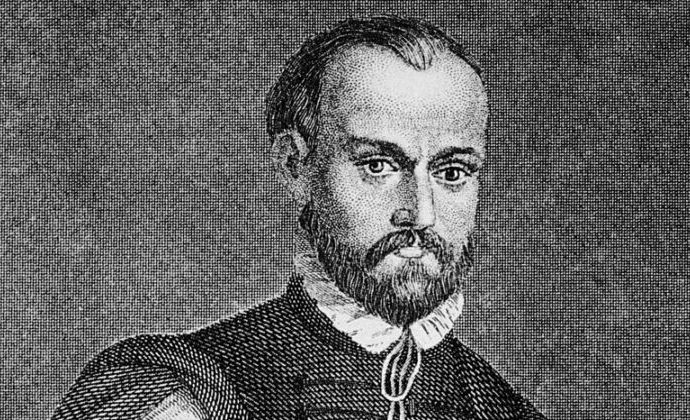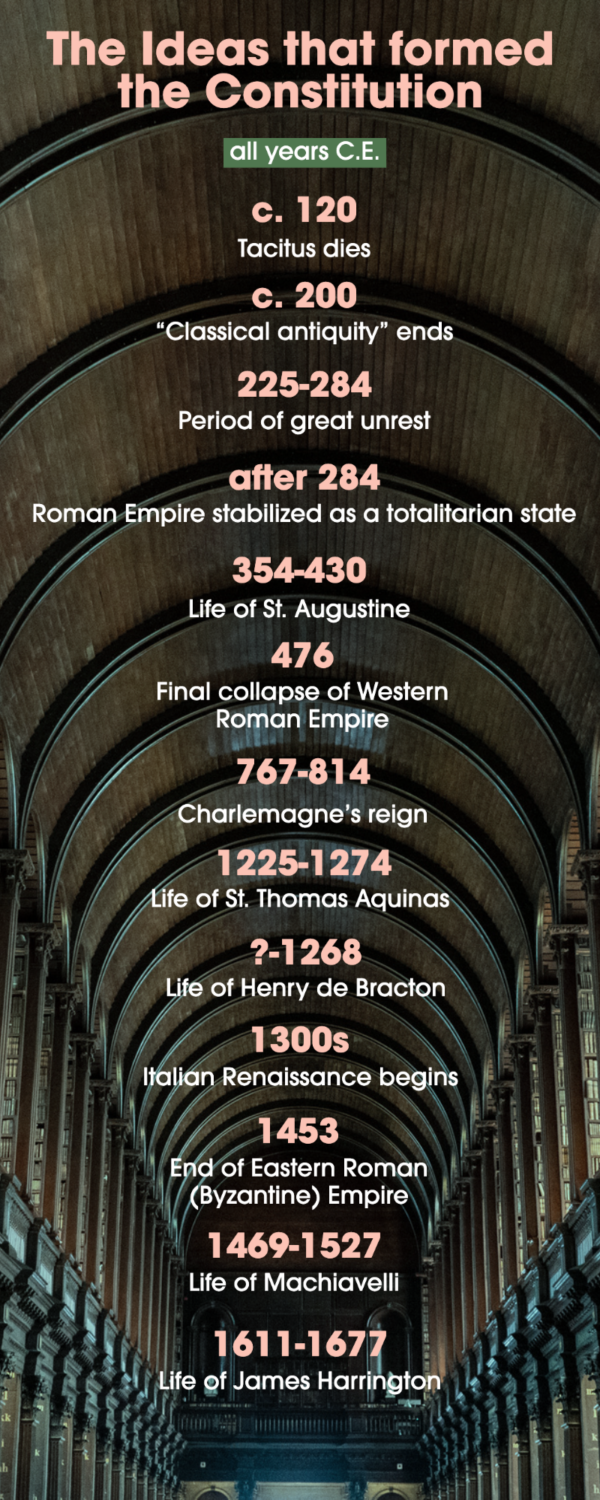This essay was first published in the Jan. 20, 2023 Epoch Times.
A span of over a thousand years separates our last writer, the Roman historian Tacitus (who died about 120 C.E.), from Niccolò Machiavelli. You might wonder: Was there no one during that time period worth covering? And, why Machiavelli? Wasn’t he an exponent of the ruthless politics the American Founders rejected?
The answer to these questions begins by understanding that the Founders lived in a classical era. An era is “classical” if the prevailing intellectual climate is one that admires science and reason, appreciates beauty with form and balance, and cares about individual rights and individual potential.
That isn’t to say that classicists are irreligious or that they ignore man’s social needs. Most of the Founders were persons of faith and recognized that man seeks happiness in society. But they esteemed classical values to a much greater extent than cultural leaders during some other times.
It’s understandable, therefore, that the Founders would look first to other classical eras for ideas and historical models. This explains their interest in ancient Greece and Rome, and in the rebirth of classical culture called the Renaissance. Machiavelli was a man of the Renaissance.
Most historians mark the end of classical antiquity at around the year 200. Although the Roman Empire in the West lasted for another 250 years, during the third century it fell upon hard times from which it never fully recovered. The culture changed with the fortunes of the Empire. One effect was a switch from classical art forms to much rougher creations. Outside of a few isolated times and locations (such as the court of Charlemagne), classical culture didn’t flourish again until the Renaissance began in Italy during the 1300s.
Of course, the period between classical antiquity and the Renaissance produced great personalities. The founding generation consulted some of these—such as St. Augustine, St. Thomas Aquinas, and Henry de Bracton—but for purposes other than political or constitutional.
Why Machiavelli?
We employ the adjective “Machiavellian” to mean politically cynical and manipulative. The epithet derives from the cynical and manipulative character of Machiavelli’s best-known book, “The Prince.” Members of the founding generation used the epithet in the same way.
However, educated members of the founding generation knew that Machiavelli wrote much more than “The Prince,” a book the Founders cited very little. They were far more interested in Machiavelli’s other works, especially his “Discourses on Livy.” The “Discourses” addressed the nature and components of republican government, and provided advice on how republics can endure.
Most educated people in the founding generation would have agreed with James Harrington, a highly regarded 17th-century author, who labeled Machiavelli as “the only politician of later Ages”—that is, the only significant political analyst from classical antiquity up to Harrington’s own time. Fortunately, there were others between Harrington’s time and the framing of the Constitution. Some of these will be central to later installments in this series.
Machiavelli’s Life
One reason the Renaissance began in Italy is a reason the classical era began in Greece: Italy was highly decentralized and politically fragmented. This forced cities to compete for talented people. It also enabled talented people to escape oppressive governments and social systems and migrate to where they were appreciated and assisted. Moreover, Italians had the advantage of living in an environment where the monuments of past classical glory towered all around them.
Several Italian cities could boast impressive achievements, but the Athens of Italy was Florence.
Machiavelli was one of those extraordinary men of affairs—like Xenophon, Cicero, Polybius, Plutarch, and Tacitus—who applied their experience to writing history and political commentary. Machiavelli was born in 1469 into the poorest branch of a prominent Florentine family. By the time he was 29 he had become the head of the city’s “Second Chancery,” which handled foreign affairs in Florence’s surrounding territories. He later served the city in several posts, including many diplomatic missions. Because of his diplomatic responsibilities, Machiavelli (like Xenophon, Polybius, and Plutarch) traveled widely.
Exile, unfortunately, was a sentence Florence’s turbulent politics imposed on many of its leading citizens (the poet Dante, for example), and Machiavelli also was exiled for several years.
Machiavelli’s literary output was impressive. In addition to “The Prince” and “Discourses on Livy” (both composed in exile), he wrote, among other works, a history of Florence, a biography, a book on the art of war, and three plays. He died of illness in 1527 at the age of 58. He was buried in Florence’s Church of Santa Croce, where his tomb still can be seen today.
Influence on the Founders
Several aspects of Machiavelli’s “Discourses on Livy” appealed to the founding generation. First, the Founders had grown up under monarchy, so they were looking for guidance for erecting a republican government. Second, Machiavelli confirmed, restated, and updated the views of Plato, Aristotle, Polybius, and Cicero on “mixed government”—the notion that republics last longest if they have monarchical, aristocratic, and democratic institutions that balance and check each other.
Third, Machiavelli confirmed a lesson the Founders had learned from experience: A strong judicial power was necessary to preserve liberty.
Fourth, he was more sympathetic to popular participation in government than most earlier writers. For example, in a portion of the “Discourses,” he argued that when the people at large are subject to the rule of law (i.e., not acting as a mere mob) they actually make better decisions and are more likely to preserve liberty than aristocratic “experts.”
Machiavelli in the Constitutional Debates
Participants in the constitutional debates of 1787–1790 frequently charged their opponents with being “Machiavellian.” But some cited the Florentine for more solid reasons.
As mentioned in earlier installments, the first volume of John Adams’s encyclopedia on republican governments was published in 1787 and circulated at the Constitutional Convention. Adams’s book also was discussed extensively during the ensuing debates over the ratification. Adams devoted seven pages to reciting verbatim Machiavelli’s discussion of monarchical, aristocratic, popular, and mixed republics in the “Discourses on Livy.”
Adams’s volume further cited Machiavelli for the rule that constitution-makers must “presume that all men are bad by nature.” In other words, constitutional rules must be drafted on the assumption that people will act in a bad way. This statement by Adams is a useful corrective to the common claim that Adams thought the Constitution could serve only a “moral people.” The truth is that Adams invested a lot of time discussing how to draft constitutions so that events worked out well if people were immoral.
Mercy Otis Warren was later a distinguished historian, but during the battle over ratification she wrote essays opposing the Constitution. She used the pen name “A Columbian Patriot.” She shared Machiavelli’s bias in favor of the people at large. Warren cited his view that “no republic ever yet stood on a stable foundation without satisfying the common people.”
A frequent argument in favor of the Constitution was that it represented only a modest change from the Articles of Confederation. A Pennsylvania opponent (“Centinel”) thought that argument was being used in bad faith. He pointed out that Machiavelli recommended that constitution makers disarm public objections by keeping old forms, even when they made major substantive changes.
John Francis Mercer represented Maryland at the Constitutional Convention, but left early and opposed the final draft. In a series of op-eds signed “A Farmer,” he made good use of Machiavelli’s wisdom. He quoted the wily Florentine on how aristocracy is tied to wealth rather than to formal titles. He also cited Machiavelli on the government of the German tribes described by Tacitus. And he quoted Machiavelli’s “deliberate opinion in favour of the body of the people, as the only safe depository of liberty and power.”
Mercer borrowed another observation from Machiavelli that seems perfectly applicable to today’s “woke” crowd:
“That we are the wisest people under the sun, seems to be no longer disputed, and those whose youthful vanity has been flattered, by a transient public applause, think that because they have come later into the world, they have therefore all the wisdom and experience, of those who have gone before them—This is the opinion of the Americans now.—Machiavelli informs us, that it was the firm persuasion of the Florentines, his countrymen, in his day … [P]erhaps the greatest share of confidence is inseperably [sic] united with the greatest share of ignorance.”
Amen.
Read prior installments here: first, second, third, fourth, fifth, sixth, seventh, eighth, ninth, tenth, eleventh. twelfth, and thirteenth.









